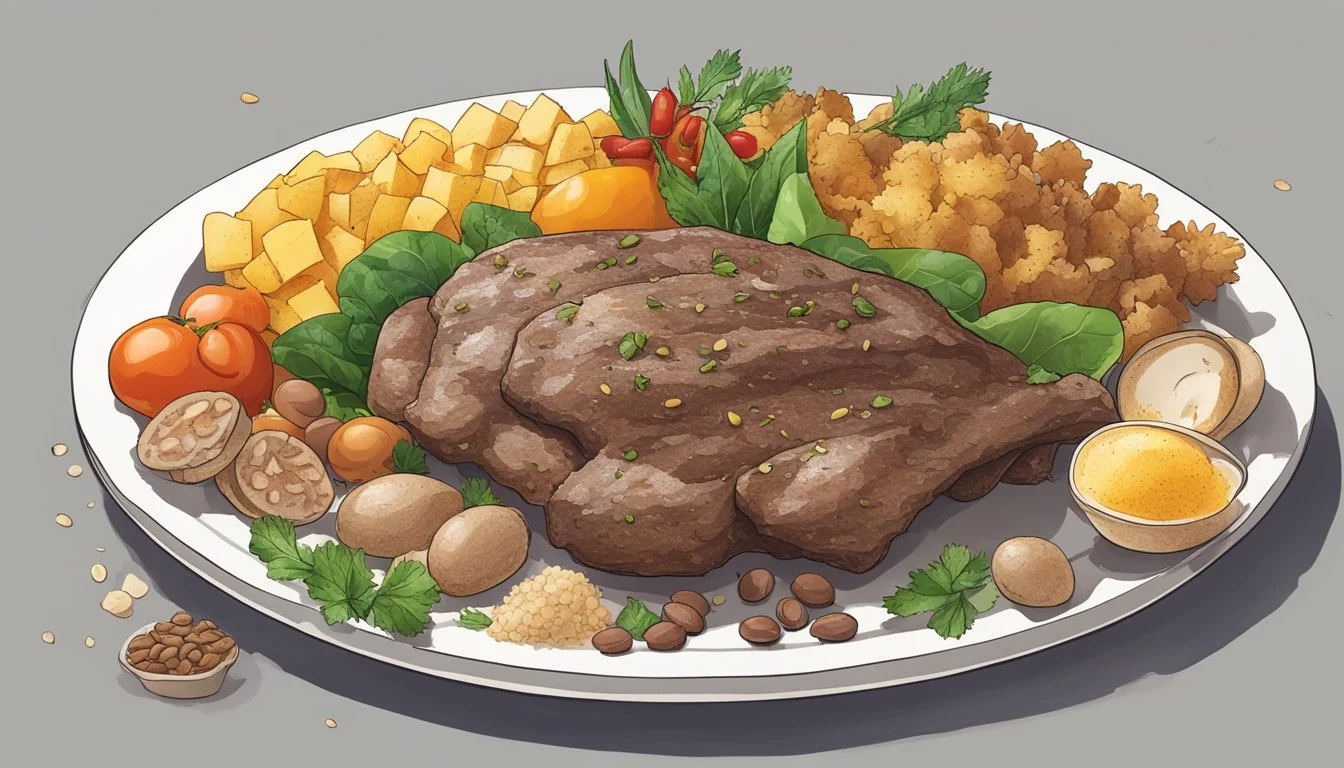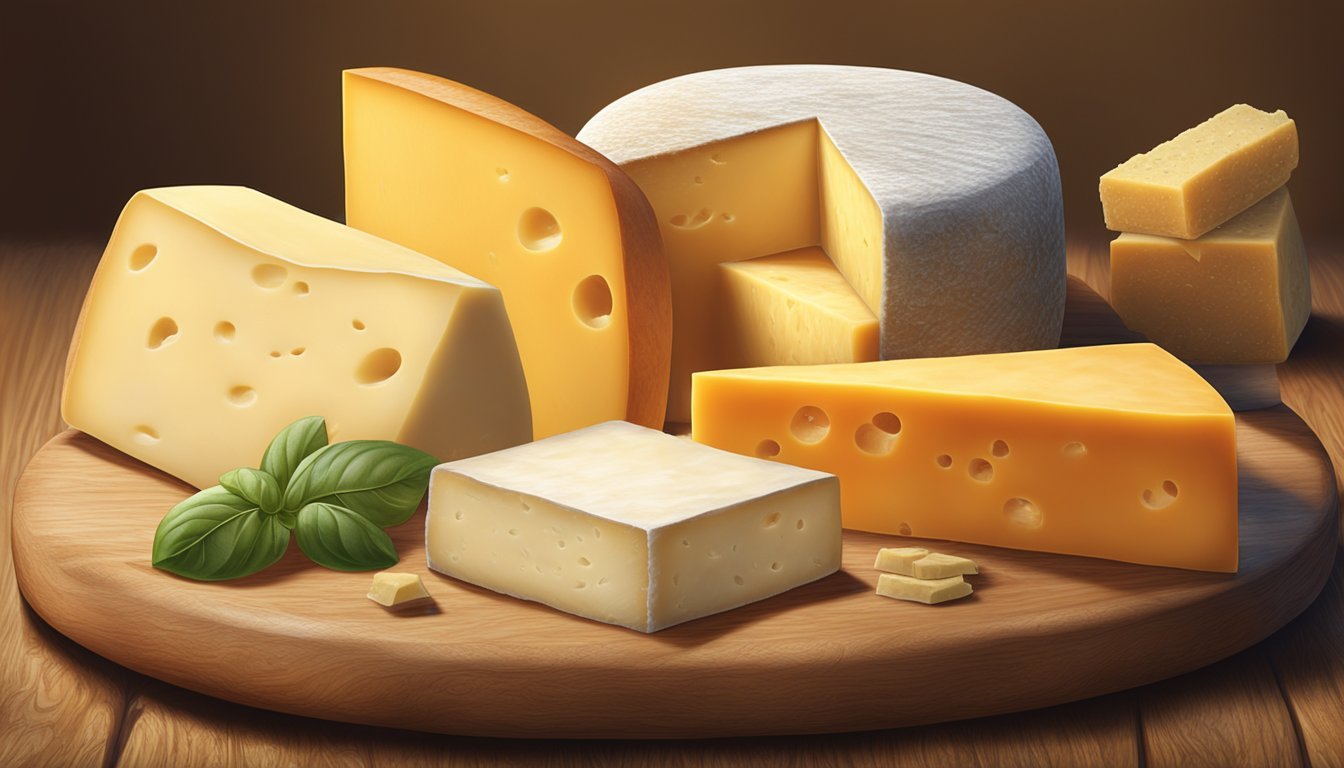Top 10 Foods Rich in Vitamin K2
Essential Sources and Benefits
Vitamin K2, a lesser-known but vital nutrient, plays a crucial role in bone and heart health by aiding calcium distribution. Unlike its counterpart, Vitamin K1, which is commonly found in leafy greens, K2 is found in a variety of animal-based and fermented foods.
For those looking to enhance their diet and improve their health, understanding which foods are high in Vitamin K2 is essential. This nutrient can help prevent chronic diseases and support overall well-being, making it an important addition to your dietary choices.
1) Natto
Natto is a staple in Japanese cuisine, known for its unique texture and strong flavor. It is made from fermented soybeans and is a rich source of vitamin K2, specifically menaquinone-7 (MK-7).
Just one tablespoon of natto contains about 150 micrograms of vitamin K2. This makes it one of the highest sources available.
Vitamin K2 in natto supports bone health by aiding in the activation of bone-building proteins. This helps transport calcium into bones, reducing the risk of osteoporosis. Vitamin K2 also plays a role in cardiovascular health by preventing arterial calcification. This can lower the risk of coronary heart disease.
Natto's fermentation process not only boosts its vitamin K2 content but also benefits gut health. The probiotic bacteria in natto help maintain a healthy digestive system. Because of its numerous health benefits, natto is often recommended for those looking to increase their vitamin K2 intake.
Despite its potent aroma and sticky texture, natto remains a popular choice for its nutritional profile. It is often eaten with rice, adding both flavor and nutrients to the meal.
2) Brie Cheese
Brie cheese is a notable source of Vitamin K2. This creamy, soft cheese is appreciated not only for its rich taste but also for its health benefits.
A serving of 30 grams of brie cheese provides a decent amount of Vitamin K2. This nutrient plays an essential role in bone health and cardiovascular wellness.
Brie cheese contains a form of Vitamin K2 known as MK-7. This form is particularly beneficial because it is effectively absorbed and utilized by the body.
Brie cheese is produced using specific bacteria that help generate Vitamin K2. These bacteria contribute to both the flavor and nutritional profile of the cheese.
For those looking to incorporate more Vitamin K2 into their diet, brie cheese offers a delicious and practical option. It can be enjoyed on its own, paired with fruits, or used in various recipes.
3) Gouda Cheese
Gouda cheese stands out as a rich source of vitamin K2. One ounce of Gouda typically provides around 20-30 micrograms of this essential nutrient.
This cheese not only offers vitamin K2 but also contains nutrients like calcium and protein, making it a valuable addition to any diet. Gouda's distinct flavor can enhance various dishes, from sandwiches to pastas.
The fermentation process used to make Gouda cheese increases its K2 content. This process contributes significantly to its health benefits, making it more beneficial compared to other cheeses. Additionally, Gouda cheese has higher levels of vitamin K2 than many other foods, including liver and egg yolks.
Including Gouda cheese in the diet is straightforward. It can easily be incorporated into daily meals without much effort. Whether melted on eggs or added to a salad, Gouda cheese provides a tasty way to boost vitamin K2 intake.
Finally, it's important to consume a balanced diet. While Gouda cheese is a good source of vitamin K2, mixing it with other foods rich in this nutrient ensures better overall health.
4) Egg Yolk
Egg yolks are a notable source of vitamin K2. Depending on the hen's diet, an egg yolk can contain between 46 and 192 micrograms of this essential nutrient.
Vitamin K2 in egg yolks plays a crucial role in bone health. It helps in the regulation of calcium deposition, ensuring that calcium is directed to bones and teeth rather than arteries.
In addition to vitamin K2, egg yolks offer other significant nutrients such as vitamins A, D, B12, and minerals like iron and phosphorus. They are also a good source of high-quality protein and healthy fats.
While eggs are versatile and can be incorporated into many meals, moderation is key. This ensures a balanced intake of fats and cholesterol, especially for those with specific dietary concerns.
Egg yolks also stand out for their contribution to overall nutrient density in the diet. They complement other dietary sources of vitamin K2, making them a valuable inclusion in a varied and balanced diet.
5) Chicken Liver
Chicken liver is a notable source of vitamin K2, particularly in its menaquinone-4 (MK-4) form.
A 1-ounce serving of chicken liver can provide around 3.6 micrograms of vitamin K2. This makes it a practical option for those looking to increase their intake of this vital nutrient.
In addition to its vitamin content, chicken liver is also rich in protein, iron, and other essential vitamins like vitamin A.
Incorporating chicken liver into your diet can be beneficial, especially for those who prefer obtaining vitamins from natural food sources rather than supplements.
Cooking methods vary, but it can be pan-fried, sautéed, or used in pâtés to maintain its nutrient profile.
Chicken liver's distinctive flavor may not be universally appealing, but its nutritional benefits are significant for those who enjoy it.
6) Grass-fed Butter
Grass-fed butter is a rich source of vitamin K2. This nutrient plays a crucial role in bone and heart health. Butter from grass-fed cows contains more K2 than conventional butter due to the cows' natural diet.
Vitamin K2 in grass-fed butter is found primarily in the MK-4 form. This form is more easily utilized by the body. It helps activate proteins responsible for calcium metabolism, thereby supporting strong bones and cardiovascular health.
In addition to vitamin K2, grass-fed butter provides other fat-soluble vitamins such as vitamin A and D. Choosing grass-fed products ensures higher levels of these important nutrients, benefiting overall health.
For those looking to increase their intake of vitamin K2, incorporating grass-fed butter into meals can be a practical and tasty option. Adding it to vegetables, spreading it on bread, or using it in cooking are simple ways to enjoy its benefits.
7) Sauerkraut
Sauerkraut is a notable source of Vitamin K2, which plays a crucial role in bone health and cardiovascular function.
Made from fermented cabbage, sauerkraut benefits from the fermentation process, which increases its Vitamin K2 content. A half-cup serving of sauerkraut can provide a modest amount of the vitamin due to this fermentation.
Besides Vitamin K2, sauerkraut contains other nutrients like fiber, which is beneficial for digestive health. It is also worth noting that sauerkraut is high in sodium due to the pickling process.
Given its nutrient profile, including sauerkraut in a balanced diet can contribute to overall well-being, especially in terms of gut health and Vitamin K2 intake.
8) Hard Cheeses
Hard cheeses are excellent sources of vitamin K2. Gouda, Edam, and Swiss cheese are among the top options for those looking to boost their intake.
Gouda cheese offers a substantial amount of vitamin K2, with 76 to 103 micrograms per 100 grams. This makes it an effective choice for enhancing bone health and supporting blood clotting functions.
Edam cheese also provides a significant vitamin K2 content, falling within the same range as Gouda. Its versatile use in various dishes makes it a practical addition to a balanced diet.
Swiss cheese is another variant rich in vitamin K2. It can be consumed as a snack or incorporated into meals such as sandwiches and salads.
Including these cheeses in regular meals can contribute to improved levels of vitamin K2, enhancing overall well-being.
9) Beef Liver
Beef liver stands out as one of the richest sources of vitamin K2. A serving of 100 grams of beef liver contains approximately 106 micrograms of vitamin K2. This makes it an excellent choice for those looking to boost their intake of this essential nutrient.
In addition to vitamin K2, beef liver is packed with other essential nutrients. It provides significant amounts of vitamin A, B vitamins, iron, and protein. This combination makes it a nutrient-dense food that can contribute to overall health.
Beef liver is versatile in the kitchen and can be prepared in various ways. It can be pan-fried, grilled, or incorporated into dishes like pâtés and stews. For those who may find its taste strong, mixing it with other meats can help make it more palatable.
Incorporating beef liver into the diet can be beneficial, especially for individuals with dietary deficiencies. However, it is important to consume it in moderation due to its high levels of certain nutrients like vitamin A. Overconsumption can lead to potential health risks. Balancing it with other food sources can help maintain a healthy diet.
10) Blue Cheese
Blue cheese is a notable source of vitamin K2, specifically in its unpasteurized form.
A 100-gram serving of unpasteurized blue cheese can provide approximately 50 micrograms of vitamin K2. This vitamin is important for processes such as bone health and proper blood clotting.
Vitamin K2 in blue cheese helps activate proteins that bind calcium, promoting bone density and cardiovascular health.
Including moderate amounts of blue cheese in a diet can contribute significantly to the recommended daily intake of vitamin K2.
When choosing blue cheese for its vitamin content, selecting unpasteurized varieties may offer higher levels of K2. This choice can make a meaningful difference in dietary vitamin intake.
What is Vitamin K2?
Vitamin K2 is a crucial nutrient that plays vital roles in various bodily functions. It exists in multiple forms, each with specific health benefits and dietary sources.
Role in the Body
Vitamin K2 is essential for the body's blood clotting mechanisms and bone health. It activates proteins that regulate where calcium is deposited in the body. This helps prevent calcium from accumulating in blood vessels and arteries, which can lead to cardiovascular issues.
Menaquinones, a subgroup of Vitamin K2, work directly with osteocalcin. Osteocalcin is a protein that supports bone mineralization. Without adequate Vitamin K2, bones can become weak, increasing the risk of fractures.
Another crucial function of Vitamin K2 is supporting dental health. It does this by assisting in the remineralization process of the teeth. Additionally, it contributes to improved cardiovascular health by preventing arterial calcification.
Different Forms of Vitamin K
Vitamin K2 comes in several forms, known as menaquinones. These include MK-4, MK-7, and up to MK-13. Each form has unique attributes and absorption rates. MK-4 is found in animal products such as chicken and eggs, offering a shorter half-life in the bloodstream.
MK-7 is commonly found in fermented foods like natto. It has a longer half-life and remains in the bloodstream longer, making it more bioavailable. This makes MK-7 a preferred form in many dietary supplements.
Other menaquinones, such as MK-8 and MK-9, also contribute to bone and cardiovascular health. The different variants ensure that the body can maintain adequate levels of this crucial nutrient from various dietary sources.
Health Benefits of Vitamin K2
Vitamin K2 provides crucial benefits for bone density and heart health. This section explores how this nutrient contributes to these important aspects of health.
Bone Health
Vitamin K2 plays a pivotal role in maintaining strong bones. It activates proteins that bind calcium, such as osteocalcin, which integrates calcium into the bone matrix. This process is essential for bone mineralization, leading to increased bone density.
Studies have shown that Vitamin K2 supplementation can reduce the risk of fractures and osteoporosis, particularly in postmenopausal women. It also decreases bone loss by directing calcium to the bones rather than soft tissues.
Common sources of Vitamin K2 for bone health include fermented foods like natto, full-fat dairy products, and chicken wings. These foods are particularly rich in menaquinone-7 (MK-7), a highly bioavailable form of Vitamin K2 effective in supporting bone health.
Cardiovascular Health
Vitamin K2 is significant for cardiovascular health. It prevents the calcification of arteries and veins by activating Matrix Gla-protein (MGP), which inhibits calcium deposits in blood vessels. This helps to maintain vessel elasticity and reduces the risk of arterial stiffness.
Research indicates that adequate intake of Vitamin K2 can lower the risk of heart disease. It supports the maintenance of heart health by ensuring calcium is directed to bones and not to arteries, potentially lowering blood pressure and reducing the risk of cardiovascular events.
Key dietary sources beneficial for cardiovascular health include fermented cheeses, eggs, and liver. These foods provide menaquinones, which are crucial for vascular health.
Dietary Sources of Vitamin K2
Vitamin K2, also known as menaquinone, is crucial for blood clotting, bone health, and cardiovascular health. It is found predominantly in animal-based foods and fermented products.
Animal-Based Sources
Animal products are among the richest sources of Vitamin K2. Liver, particularly beef liver, is one of the most concentrated sources. Consuming 100 grams can provide a substantial amount of menaquinone.
Cheese and butter are also excellent sources, with aged varieties like Gouda and Brie offering higher levels. Chicken, especially the darker cuts like thighs and wings, contains significant amounts of this vitamin, providing about 25.3 micrograms per 100 grams.
For those who include seafood in their diet, eel offers a good alternative with about 63 micrograms per 100 grams, fulfilling the recommended daily levels.
Fermented Foods
Fermented products are another significant source of Vitamin K2. Among these, Natto stands out, a traditional Japanese dish made from fermented soybeans. It contains a very high concentration of menaquinone-7, possibly the highest of any food.
Sauerkraut and other fermented vegetables also provide notable but lesser amounts. The fermentation process increases the bioavailability of Vitamin K2, making these products beneficial for those looking to boost their intake naturally.
Kefir and other fermented dairy products, although less concentrated than Natto, still offer a good source of the vitamin, particularly when consumed regularly.






